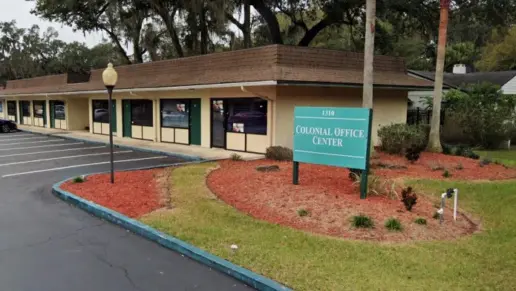I had a loved one go to Lakeview Health. They treated him with amazing care and allowed him to have the opport
About Lakeview Health
Lakeview Health is a Joint Commission accredited, private rehab in Jacksonville, Florida. Established in 2001, they work continuously to elevate treatment standards, end stigma and demonstrate positive changes in the community. Adult men and women can participate in a specialized continuum of care for addiction, dual diagnosis, eating disorders and chronic pain. You’ll benefit from flexible payment options including private insurance, self payment and financing.
Whether you need daily, continuous support or are a busy professional juggling multiple responsibilities, their programs meet you at any stage in recovery. You can access a personalized treatment plan with proven and holistic interventions to fit your unique situations.
Their treatment philosophy stems from a whole person approach. You’ll participate in individual, group and family sessions with cognitive behavioral, experiential, dialectical behavior, and trauma informed therapies.
They complement care with interventions to heal your mind, body and soul. These include art therapy, fitness, recreation therapy, yoga and music therapy. Along with getting to the root of addiction, these approaches can help you enhance your self esteem, identify triggers, rebuild relationships and foster a solid support system.
What stands out most to me is their gender specific facilities. Each provides a comfortable living environment with premier relaxation features. The men’s rehab has a bistro, gym, music room and recreational rooms. The women’s treatment center also boasts incredible amenities like a spa, pool, wellness centers and yoga and dance rooms. They use tailored, gender responsive approaches to provide customized care that helps men and women address unique challenges in a supportive environment.
Another standout element is their aftercare program. From the moment you begin treatment, their team starts working on your aftercare plan. They’re dedicated to helping you seamlessly transition to life after rehab. You’ll benefit from sober living options, certified recovery coaching, group events, ongoing individual therapy, continued peer support and follow ups. Their unwavering support and fellowship don’t end when you complete treatment. Instead, you’ll have an empathetic team of professionals and peers to help you stay on track in recovery.
Latest Reviews
Rehab Score
Gallery
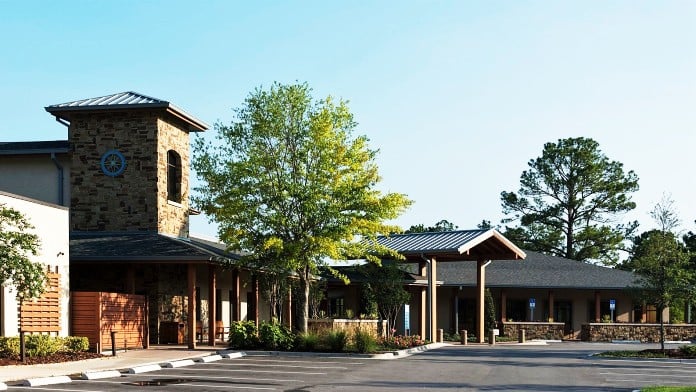
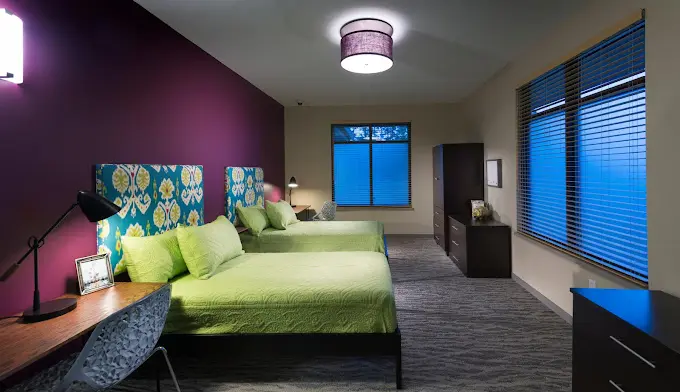
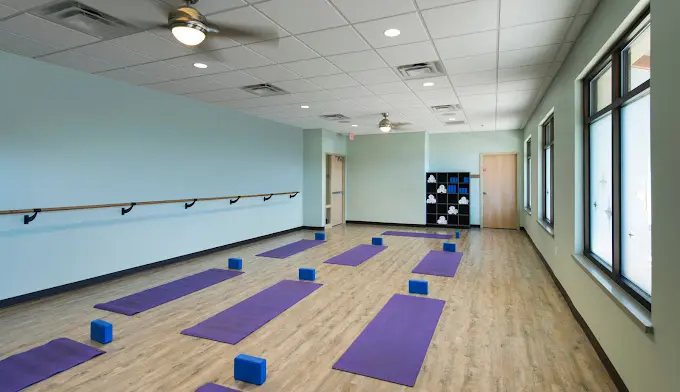
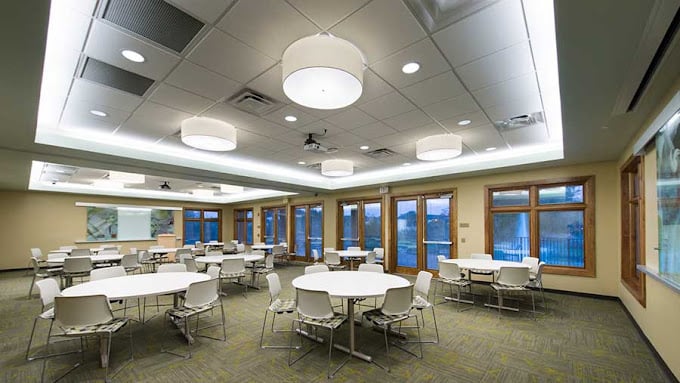

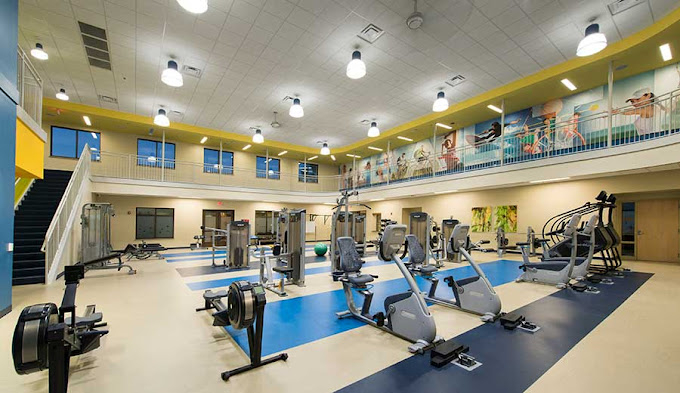
Location
Accepted Insurance
Other Forms of Payment
Private insurance refers to any kind of healthcare coverage that isn't from the state or federal government. This includes individual and family plans offered by an employer or purchased from the Insurance Marketplace. Every plan will have different requirements and out of pocket costs so be sure to get the full details before you start treatment.
Self-pay involves paying for treatment out of your own pocket. You can use savings or credit, get a personal loan, or receive help from family and friends to fund your treatment. If you don't have insurance or your insurance plan doesn't cover a specific program, self-pay can help ensure you still get the care you need.
Addiction Treatments
Levels of Care
Treatments
The goal of treatment for alcoholism is abstinence. Those with poor social support, poor motivation, or psychiatric disorders tend to relapse within a few years of treatment. For these people, success is measured by longer periods of abstinence, reduced use of alcohol, better health, and improved social functioning. Recovery and Maintenance are usually based on 12 step programs and AA meetings.
Drug rehab in Florida provides quality treatment to help individuals overcome dependency related to a wide range of addictive substances. Programs address both the physical and mental aspects of addiction in order to help you make a full recovery.
Many of those suffering from addiction also suffer from mental or emotional illnesses like schizophrenia, bipolar disorder, depression, or anxiety disorders. Rehab and other substance abuse facilities treating those with a dual diagnosis or co-occurring disorder administer psychiatric treatment to address the person's mental health issue in addition to drug and alcohol rehabilitation.
A combined mental health and substance abuse rehab has the staff and resources available to handle individuals with both mental health and substance abuse issues. It can be challenging to determine where a specific symptom stems from (a mental health issue or an issue related to substance abuse), so mental health and substance abuse professionals are helpful in detangling symptoms and keeping treatment on track.
Opioid rehabs specialize in supporting those recovering from opioid addiction. They treat those suffering from addiction to illegal opioids like heroin, as well as prescription drugs like oxycodone. These centers typically combine both physical as well as mental and emotional support to help stop addiction. Physical support often includes medical detox and subsequent medical support (including medication), and mental support includes in-depth therapy to address the underlying causes of addiction.
Programs



Clinical Services
Cognitive Behavioral Therapy (CBT) is a therapy modality that focuses on the relationship between one's thoughts, feelings, and behaviors. It is used to establish and allow for healthy responses to thoughts and feelings (instead of unhealthy responses, like using drugs or alcohol). CBT has been proven effective for recovering addicts of all kinds, and is used to strengthen a patient's own self-awareness and ability to self-regulate. CBT allows individuals to monitor their own emotional state, become more adept at communicating with others, and manage stress without needing to engage in substance abuse.
Whether a marriage or other committed relationship, an intimate partnership is one of the most important aspects of a person's life. Drug and alcohol addiction affects both members of a couple in deep and meaningful ways, as does rehab and recovery. Couples therapy and other couples-focused treatment programs are significant parts of exploring triggers of addiction, as well as learning how to build healthy patterns to support ongoing sobriety.
Creativity is inherently healing, and can help those in recovery express thoughts or feelings they might not otherwise be able to. Creative arts therapy can include music, poetry/writing, painting, sculpting, dance, theater, sandplay, and more. Unlike traditional art, the final product matters far less than the experience of creation and expression itself.
Dialectical Behavior Therapy (DBT) is a modified form of Cognitive Behavioral Therapy (CBT), a treatment designed to help people understand and ultimately affect the relationship between their thoughts, feelings, and behaviors. DBT is often used for individuals who struggle with self-harm behaviors, such as self-mutilation (cutting) and suicidal thoughts, urges, or attempts. It has been proven clinically effective for those who struggle with out-of-control emotions and mental health illnesses like Borderline Personality Disorder.
Equine therapy, aka equine-assisted therapy (EAT), is a form of experiential therapy that involves interactions and activities with horses. It does not necessarily involve riding horses, but all activities related to horses, such as feeding, grooming, haltering and leading them. A mental health professional frequently oversees the activities (often in conjunction with a horse professional), and helps patients process their thoughts, feelings, and behavior patterns during and/or after the interaction. One of the types of experiential therapy featured at Lakeview Health is the unique practice of equine therapy. employs the EAGALA Model Equine Assisted Psychotherapy in working with patients struggling to let their guard down, helping them uncover their strengths, learning how to take responsibility for their choices and actions, realize their obstacles, and practice new skills. This entire experience is enhanced by the inclusion of horses, which they interact with and learn from.
Experiential therapy is a form of therapy in which clients are encouraged to surface and work through subconscious issues by engaging in real-time experiences. Experiential therapy departs from traditional “talk therapy” by involving the body, and having clients engage in activities, movements, and physical and emotional expression. This can involve role-play or using props (which can include other people). Experiential therapy can help people process trauma, memories, and emotion quickly, deeply, and in a lasting fashion, leading to substantial and impactful healing. Building the confidence to live life in sobriety takes time. Patients in IOP at Lakeview Health are able to participate in experiential therapy, which includes surf therapy and equine therapy. These groups are optional.
EMDR is a therapeutic modality originally developed to help process trauma. In an EMDR session, a patient is prompted to undergo eye movements that mimic those of REM sleep. This is accomplished by watching a therapist's finger move back and forth across, or following a bar of light. The goal is repetitive sets of eye movements that help the brain reprocess memory, which can significantly reduce the intensity of remembered traumatic incidents. Associated memories can heal simultaneously, leaving patients significantly calmer, more stable, and more emotionally relaxed.
Research clearly demonstrates that recovery is far more successful and sustainable when loved ones like family members participate in rehab and substance abuse treatment. A three-day family workshop is part of their gender responsive treatment program at Lakeview Health. Like all of their treatments, it’s based entirely on the most current, evidence-based best practices. They’re committed to helping the families of their patients mend their relationships, and their staff is handpicked to ensure the best quality of care.
Group therapy is any therapeutic work that happens in a group (not one-on-one). There are a number of different group therapy modalities, including support groups, experiential therapy, psycho-education, and more. Group therapy involves treatment as well as processing interaction between group members.
In individual therapy, a patient meets one-on-one with a trained psychologist or counselor. Therapy is a pivotal part of effective substance abuse treatment, as it often covers root causes of addiction, including challenges faced by the patient in their social, family, and work/school life.
Life skills trainings involve all the skills a person must have in order to function successfully in the world. These include time management, career guidance, money management, and effective communication. Truly successful addiction recovery is based on the ability to not only live substance-free, but to thrive. Life skills teaches the practical necessities of functioning in society, which sets clients up for success in life, and therefore sobriety.
Motivational Interviewing (MI) is a clinical approach to helping people with substance abuse issues and other conditions shift behavior in positive ways. It is more goal-oriented than traditional psychotherapy, as MI counselors directly attempt to get clients to consider making behavioral change (rather than wait for them to come to conclusions themselves). Its primary purpose is to resolve ambivalence and help clients become able to make healthy choices freely.
Nicotine Replacement Therapy (NRT) is a way of getting nicotine into the bloodstream without smoking. It uses products that supply low doses of nicotine to help people stop smoking. The goal of therapy is to cut down on cravings for nicotine and ease the symptoms of nicotine withdrawal.
Nutrition therapy, aka medical nutrition therapy (MNT), is a way of treating physical, emotional, and medical conditions through diet. Specific dietary plans are designed by professional nutritionists or registered dietitians, and patients follow them in order to positively affect their physical and mental health.
At Lakeview Health, they understand past trauma and know how to help you deal with it. They follow guidelines established by the Substance Abuse and Mental Health Services Administration (SAMHSA) for best practices in trauma-informed care. Their team creates an atmosphere where you can explore, understand, and process your past trauma. They help you understand how the sum of your life experiences add up to where you are now, and teach you the coping skills you need to move forward and break the painful cycles of substance abuse and mental health disorders. The gender-responsive facilities allow women and men completely separate facilities to begin to heal.
Amenities
-
Lakeside
-
Yoga Studio
-
Spa
-
Gym
Accreditations

The Joint Commission, formerly known as JCAHO, is a nonprofit organization that accredits rehab organizations and programs. Founded in 1951, the Joint Commision's mission is to improve the quality of patient care and demonstrating the quality of patient care.
Joint Commission Accreditation: Yes
Accreditation Number: 383876

LegitScript has reviewed Lakeview Health as part of their certification program, and has determined that it meets the LegitScript standards for legality, safety and transparency.
LegitScript verified in November 2019

The National Association of Addiction Treatment Providers (NAATP) is a professional association that represents organizations in the field of addiction services. Founded in 1978, NAATP's mission is to advance addiction services and ensure that high-quality addiction treatment is available and accessible.
NAATP Member: Yes
Member ID: 1799
Contact Information
1900 Corporate Square Blvd
Jacksonville, FL 32216



